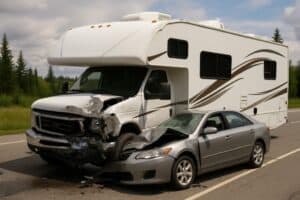Hitting the open road in a recreational vehicle promises freedom and adventure, but it also carries unique risks. A single accident can quickly turn a relaxing trip into a legal challenge, especially when questions of liability come into play. In places where outdoor lifestyles thrive, ATVs, boats, and RVs are common—and when something goes wrong, figuring out who is responsible can be complicated. That’s why many turn to trusted Issaquah accident lawyers, who regularly navigate cases where liability may involve private owners, rental companies, or even public land authorities.

The Unique Nature of RV Accidents
Recreational vehicle accidents are often far more complicated than standard car crashes because of the wide range of vehicles involved—everything from motorhomes and camper vans to ATVs and boats. For example, a collision between a motorhome and a passenger car may raise questions about weight distribution, blind spots, and braking distance. At the same time, an ATV rollover on a public trail could involve liability shared between the rider, the equipment manufacturer, and the land management authority. This variety makes it challenging to apply a single legal standard, and each case requires a close examination of the specific circumstances.
Legal Implications and Liability
Liability in recreational vehicle accidents is rarely straightforward. Unlike standard car crashes, where responsibility often lies with the driver, RV accidents may involve multiple layers of accountability. For instance, if a motorhome’s brakes fail because of poor maintenance, the repair shop—or even the manufacturer—could share responsibility. A collision caused by a rental RV with faulty tires might implicate the rental company for failing to inspect its fleet.
Accidents on public land add even more complexity. Imagine an ATV rollover on a poorly maintained trail inside a state park. In that scenario, the injured party may argue that the government agency responsible for trail upkeep should share in the liability. Similarly, if inadequate signage or unmarked hazards on a public road contribute to an accident, liability could extend beyond the driver to the municipality responsible for maintaining safe conditions. These overlapping responsibilities make RV cases uniquely challenging from a legal perspective.
Differentiating Between Personal and Public Liability
Personal Liability
Personal liability most often applies when the driver’s own actions directly cause harm. If an RV operator speeds down a steep grade, drives while fatigued, or fails to secure a tow-behind trailer, they can be held responsible for the resulting damage or injuries. Insurance companies typically focus on these behaviors when determining fault.
Public Liability
Public liability arises when the environment or infrastructure plays a role in the accident. For example, if a motorhome accident occurs because a bridge height wasn’t clearly marked, or if a campground roadway was left in disrepair, the government or managing agency could bear part of the blame. In these cases, public entities may be required to compensate victims alongside any private parties involved.
Key Factors That Shape Liability
- Cause of the Accident: A mechanical defect might implicate a manufacturer, while driver negligence keeps liability squarely on the individual.
- Location: A crash on a public highway could involve municipal or state liability, whereas a private campground incident might fall under the property owner’s responsibility.
- Involvement of Public Entities: When government infrastructure, signage, or land maintenance is a factor, liability may extend beyond private parties to public agencies.
Why Distinguishing Liability Matters
Being able to separate personal from public liability is more than a technicality. Trusted Issaquah accident lawyers know it can determine how insurance claims are processed and whether victims receive full compensation. For example, if only the driver is held liable when a poorly maintained public roadway was also a factor, victims may miss out on additional avenues for recovery. For RV owners, renters, and operators, understanding these distinctions can also influence the type of insurance coverage they choose. In short, knowing where responsibility lies helps ensure accountability is fairly distributed and that victims are not left to shoulder the burden alone.
Final Thoughts
Recreational vehicle accidents rarely fit neatly into one category, and that’s what makes them so difficult to resolve. Driver mistakes, mechanical failures, poor maintenance, and unsafe public infrastructure can all overlap, creating a web of responsibility that isn’t immediately clear. For RV owners and operators, this means that understanding liability isn’t just about knowing the rules of the road: it’s about recognizing how personal actions and public obligations intersect.





